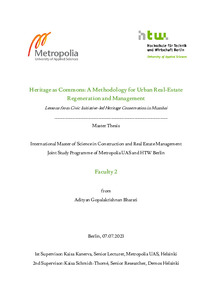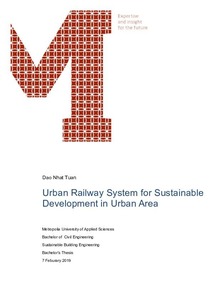Heritage as Commons - A Methodology for Urban Real-Estate Regeneration and Management : Lessons from Civic Initiative-led Heritage Conservation in Mumbai
Bharati, Adityan Gopalakrishnan (2023)
Bharati, Adityan Gopalakrishnan
2023
Julkaisun pysyvä osoite on
https://urn.fi/URN:NBN:fi:amk-2023122639110
https://urn.fi/URN:NBN:fi:amk-2023122639110
Tiivistelmä
This thesis presents a comprehensive framework for urban regeneration through commoning, focusing on the sustainable development of heritage precincts. The framework is developed based on an in-depth analysis of urban commons, heritage conservation, and real-estate management methodologies. The need for such a framework arose from increasing international interest towards integrating community engagement in heritage conservation practices and the success of similar projects from Mumbai, India, that placed the city on the World Heritage map. Hence, drawing inspiration from established models and frameworks in the different domains and the case study mentioned earlier, the presented conceptual framework offers a dynamic approach to managing heritage projects.
The framework synthesis builds upon the Faro Convention Network Process. It incorporates tools and insights that emphasize the importance of stakeholder engagement and the active involvement of the broader community throughout the various phases of a project while also recognizing the specialized nature of heritage conservation and the potential lack of community skills. A facilitator role is proposed to provide resources and expertise to address this. The framework also highlights the importance of a broader network for additional support and resources, enhancing regeneration efforts along with possible real estate ownership, partnership, and financing models. The framework promotes shared ownership and community participation by leveraging the collective wisdom within the heritage community.
The research paper also presents a comparative analysis of the projects in the case study, demonstrating the alignment and effectiveness of the framework with the existing theoretical models and frameworks. The findings underscore the framework's potential in achieving sustainable heritage precinct regeneration through commoning processes.
In conclusion, this research paper contributes to heritage conservation and urban development by providing a comprehensive framework for managing heritage projects through commoning. It emphasizes community participation, collaboration, and cultural preservation. Adopting this framework allows stakeholders to navigate regeneration complexities and contribute to sustainable urban development.
The framework synthesis builds upon the Faro Convention Network Process. It incorporates tools and insights that emphasize the importance of stakeholder engagement and the active involvement of the broader community throughout the various phases of a project while also recognizing the specialized nature of heritage conservation and the potential lack of community skills. A facilitator role is proposed to provide resources and expertise to address this. The framework also highlights the importance of a broader network for additional support and resources, enhancing regeneration efforts along with possible real estate ownership, partnership, and financing models. The framework promotes shared ownership and community participation by leveraging the collective wisdom within the heritage community.
The research paper also presents a comparative analysis of the projects in the case study, demonstrating the alignment and effectiveness of the framework with the existing theoretical models and frameworks. The findings underscore the framework's potential in achieving sustainable heritage precinct regeneration through commoning processes.
In conclusion, this research paper contributes to heritage conservation and urban development by providing a comprehensive framework for managing heritage projects through commoning. It emphasizes community participation, collaboration, and cultural preservation. Adopting this framework allows stakeholders to navigate regeneration complexities and contribute to sustainable urban development.
Kokoelmat
Samankaltainen aineisto
Näytetään aineisto, joilla on samankaltaisia nimekkeitä, tekijöitä tai asiasanoja.
-
Urban Railway System for Sustainable Development in Urban Area
Nhat Tuan, Dao (Metropolia Ammattikorkeakoulu, 2019)The aim of this thesis was to study an urban railway system for sustainable development of a metropolitan area. The thesis studied a basic type of municipal railway and its implementation by, first, studying two well-developed ... -
Mapping Thermal Hotspots in Malé, Maldives : Assessing the Relationship Between Urban Heat Islands, Climate, and Heat Risk for Sustainable Urban Planning
Hameed, Aminath Maiha (2023)This study aims to support climate-conscious urban development in greater Male’, Maldives, based on characterizations of the local microclimate. It explores intra-urban temperature variations, identifies heat risks and ... -
Assessing the Influence of Urban Form on the Cooling Impacts of Urban Parks : A Case Study in Glasgow
Lelei, Najma Yusuf (2023)Urban Heat Island (UHI) effect has been a growing concern in the UK; therefore, the mitigation of such effects would contribute to sustainable urban development. A review of literature indicates that green infrastructure ...



